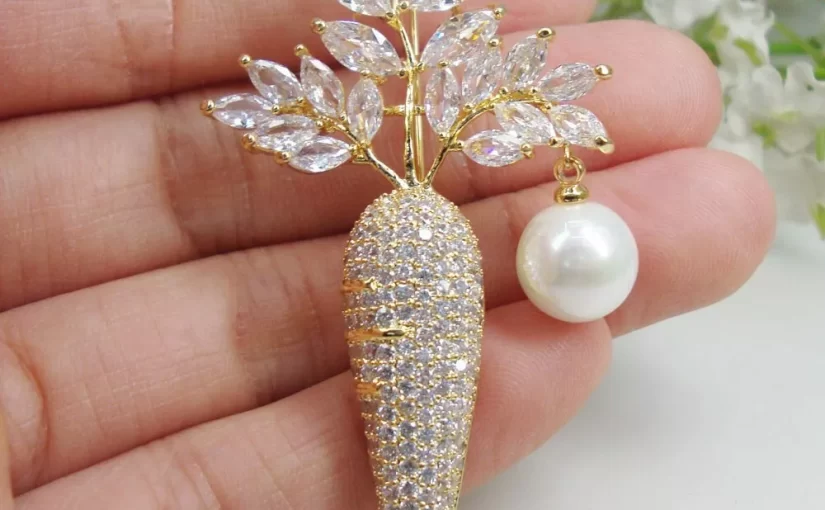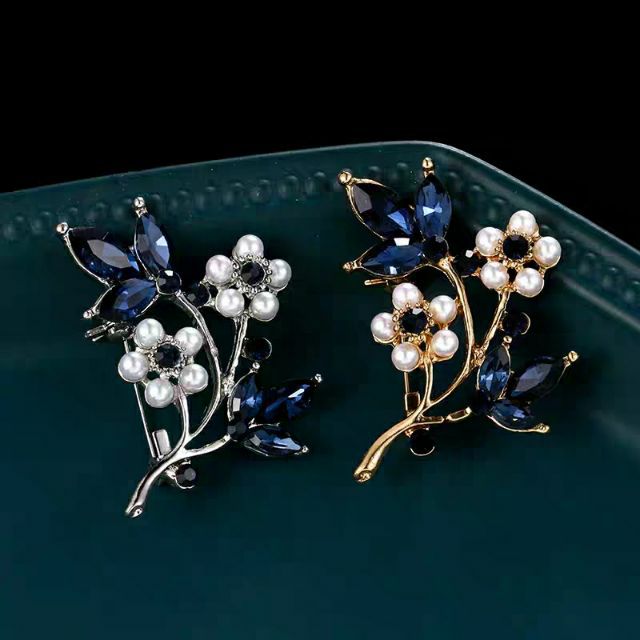Introduction
Brooches have been a timeless accessory in the world of fashion and jewelry for centuries. From ancient civilizations to modern-day runways, brooch pin(Japanese: ブローチピン) has evolved from simple functional items into intricate works of art. They are not only decorative but also carry cultural, historical, and sentimental significance. This article delves deep into the world of brooch pin, exploring their history, design, materials, symbolism, and contemporary trends. Whether you’re a seasoned collector or a curious enthusiast, this guide will provide you with a comprehensive understanding of the captivating allure of brooch pin.
A Journey Through Time – The History of Brooch Pin
Ancient Beginnings
Early Functional Use
Brooches originated as functional fasteners used to secure clothing. In ancient times, they were primarily made from materials like bone, wood, and metal. These early brooches were practical tools that held garments together, especially in colder climates where warmth was essential. For instance, the Celts used fibulae, a type of brooch, to fasten cloaks and tunics.
Cultural Significance
Beyond their utilitarian purpose, brooches quickly became symbols of status, power, and identity. In many cultures, the design and material of a brooch indicated one’s social standing. For example, Roman soldiers wore ornate brooches as part of their military attire, symbolizing rank and achievements. Similarly, Viking warriors adorned themselves with brooches featuring mythological motifs, which conveyed bravery and strength.
Evolution Over Centuries
Renaissance and Baroque Eras
During the Renaissance, brooches transformed from mere fasteners into elaborate pieces of jewelry. Artists began incorporating precious stones, enamel, and intricate metalwork into their designs. Brooches became more decorative, often featuring religious themes and natural elements like flowers and animals. The Baroque era further embellished brooches with pearls, diamonds, and gold, making them highly coveted by the elite.
Victorian Era and Beyond
The Victorian era marked a significant milestone in the history of brooches. Queen Victoria popularized mourning brooches, which were worn to honor deceased loved ones. These brooches often contained locks of hair or were inscribed with personal messages. As the Industrial Revolution advanced, mass production techniques allowed brooches to become more accessible to the middle class. By the 20th century, brooches had become versatile accessories, suitable for both formal and casual occasions.
Crafting Beauty – Materials and Techniques
Traditional Materials
Precious Metals
Gold, silver, and platinum are among the most prized materials for crafting brooches. Gold, with its rich luster and durability, has been a favorite for centuries. Silver offers a more affordable yet equally elegant option, while platinum is known for its strength and hypoallergenic properties. Each metal brings unique characteristics to the piece, influencing its weight, color, and overall appearance.
Gemstones and Pearls
Gemstones add a touch of brilliance and luxury to brooches. Diamonds, rubies, sapphires, and emeralds are commonly used to create stunning focal points. Pearls, with their natural iridescence, bring a soft elegance to brooch designs. The choice of gemstone can significantly impact the value and aesthetic appeal of a brooch, making it a cherished heirloom or a statement piece.
Modern Innovations
Alternative Materials
In recent years, designers have experimented with alternative materials to create innovative and eco-friendly brooches. Materials like resin, acrylic, and recycled metals offer new possibilities for creative expression. Resin, for instance, allows for vibrant colors and unique textures, while recycled metals promote sustainability. These materials cater to a broader audience, including those who prefer contemporary or minimalist styles.
Advanced Techniques
Modern technology has revolutionized the crafting process, enabling artisans to achieve greater precision and complexity. Laser cutting, 3D printing, and computer-aided design (CAD) have opened up new avenues for creativity. These techniques allow for the creation of intricate patterns, delicate filigree work, and even custom-made pieces tailored to individual preferences. The fusion of traditional craftsmanship with cutting-edge technology ensures that brooches remain relevant and exciting in today’s market.
Symbolism and Sentimentality
Cultural Symbols
Religious and Spiritual Themes
Brooch bin has long been associated with religious and spiritual beliefs. In many cultures, they serve as talismans or amulets, believed to offer protection and guidance. For example, Christian brooches often feature crosses, saints, or biblical scenes, symbolizing faith and devotion. Similarly, Hindu brooches may incorporate deities or sacred symbols like the lotus flower, representing purity and enlightenment. These pieces not only adorn the wearer but also convey deeper meanings and values.
National and Ethnic Identity
Brooches also play a crucial role in expressing national and ethnic identity. Scottish tartan brooches, for instance, celebrate the country’s heritage and clan traditions. Native American brooches, crafted from silver and turquoise, reflect the rich cultural history of indigenous peoples. Each design element, from patterns to motifs, tells a story about the wearer’s roots and affiliations. Brooches thus serve as tangible connections to one’s ancestry and community.
Personal Significance
Love and Relationships
One of the most poignant uses of the brooch bin is to commemorate love and relationships. Engagement brooches, wedding brooches, and anniversary brooches all hold special significance. These pieces often include personalized engravings, birthstones, or family crests, making them unique and meaningful gifts. A brooch can encapsulate the depth of emotion and commitment shared between two people, serving as a lasting reminder of their bond.
Milestones and Memories
Brooches are also perfect for marking milestones and preserving memories. Graduation brooches, travel brooches, and commemorative brooches capture important moments in life. Whether it’s celebrating an academic achievement, documenting a memorable journey, or honoring a significant event, these brooches become treasured keepsakes. They offer a way to relive cherished memories and share personal stories through fashion.
Design Trends and Styles
Classic Elegance
Vintage and Retro Influences
Vintage and retro styles continue to influence brooch design, evoking nostalgia and timeless beauty. Art Deco brooches, with their geometric shapes and bold lines, exude sophistication. Mid-century modern brooches, characterized by clean simplicity and organic forms, offer a fresh yet classic look. Collectors and enthusiasts alike appreciate the enduring charm of these styles, which never go out of fashion. Incorporating vintage elements into contemporary designs creates a harmonious blend of old and new, appealing to a wide range of tastes.
Floral and Nature-Inspired Motifs
Floral and nature-inspired motifs remain perennial favorites in brooch design. Delicate blossoms, leaves, and butterflies bring a touch of romance and whimsy to any outfit. Botanical brooches, often handcrafted with meticulous attention to detail, showcase the beauty of the natural world. These pieces can be subtle or statement-making, depending on the occasion and personal preference. Floral brooches are particularly popular for weddings, spring events, and everyday wear, adding a dose of elegance and grace.
Contemporary Expressions
Minimalist and Geometric Designs
Minimalist and geometric designs reflect modern sensibilities, favoring simplicity and clean lines. These brooches often feature abstract shapes, monochrome palettes, and sleek finishes. They offer a versatile and understated option for those who prefer a less-is-more approach. Geometric brooches can be paired with various outfits, from casual daywear to formal evening attire. Their versatility makes them a staple in contemporary wardrobes, appealing to individuals who appreciate elegance without excess.
Avant-Garde and Experimental Art
For those seeking something truly unique, avant-garde and experimental brooches push the boundaries of conventional design. These pieces challenge traditional notions of beauty and function, incorporating unconventional materials, asymmetrical forms, and bold colors. Avant-garde brooches are often created by independent artists and designers, showcasing their innovative vision and artistic flair. These daring creations stand out as conversation starters, attracting attention and admiration from fashion-forward individuals.
Wearing and Caring for Brooch Pins
Styling Tips
Versatile Placement
One of the greatest advantages of brooches is their versatility in placement. While traditionally pinned on lapels or collars, brooches can be worn in numerous ways to enhance any ensemble. Attach a brooch to a scarf for a pop of color, secure it on a handbag for added flair, or pin it to a belt for a stylish accent. Experimenting with different placements allows you to personalize your look and express your individuality. Brooches can transform even the simplest outfit into a fashion statement.
Complementary Accessories
When styling brooches, consider how they interact with other accessories. A brooch can complement or contrast with earrings, necklaces, and bracelets, creating a cohesive or eclectic look. For a coordinated ensemble, choose brooches that match or coordinate with other jewelry pieces. Alternatively, mix and match contrasting elements for a bold, eclectic vibe. The key is to strike a balance between the brooch and other accessories, ensuring that each item enhances rather than overwhelms the overall appearance.
Maintenance and Preservation
Proper Storage
To preserve the longevity and beauty of your brooch collection, proper storage is essential. Store brooches in individual compartments or padded boxes to prevent scratches and tangling. Avoid exposing them to excessive moisture, heat, or direct sunlight, as these elements can damage delicate components. Using anti-tarnish strips or silica gel packets can help maintain the condition of metal and gemstone brooches. Regular cleaning with a soft cloth and mild soap solution will keep your brooches looking their best.
Handling with Care
When handling brooches, exercise caution to avoid accidental damage. Always use the clasp or pin mechanism carefully to prevent bending or breaking. If a brooch requires repairs or adjustments, consult a professional jeweler to ensure proper care. Regular maintenance and gentle handling will extend the lifespan of your brooches, allowing you to enjoy them for years to come. Treating your brooches with care shows respect for their craftsmanship and sentimental value.
Conclusion
Brooch pin is more than just decorative accessory; it is windows into history, culture, and personal expression. From ancient origins as functional fasteners to their evolution into intricate works of art, brooches have captivated hearts and minds for centuries. Understanding the materials, techniques, symbolism, and trends behind brooches enriches our appreciation for these timeless pieces. Whether you choose a classic design or an avant-garde creation, a brooch can elevate your style and tell your story. Embrace the art and allure of brooch pin, and let them become a cherished part of your wardrobe and legacy.





